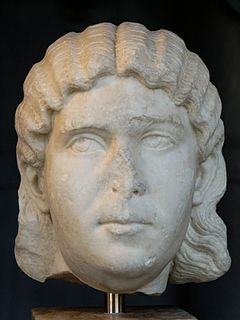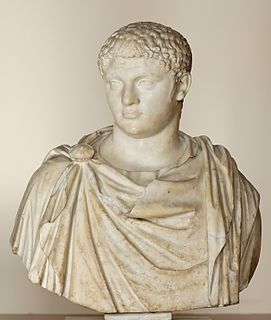Marcus Julius Philippus Severus, also known as Philippus II, Philip II and Philip the Younger (238–249) was the son and heir of the Roman Emperor Philip the Arab by his wife Marcia Otacilia Severa. According to numismatic evidence, he had a sister called Julia Severa or Severina, whom the extant literary sources do not mention, and a brother, Quintus Philippus Severus.

Marcus Julius Philippus, also known commonly by his nickname Philip the Arab, was Roman Emperor from February 244 to September 249. He was born in Arabia Petraea, the Roman province of Arabia, in a city situated in modern-day Syria. He went on to become a major figure in the Roman Empire. After the death of Gordian III in February 244, Philip, who had been Praetorian prefect, achieved power. He quickly negotiated peace with the Persian Sassanid Empire. During his reign, the city of Rome celebrated its millennium.

Marcia Otacilia Severa or Otacilia Severa was the Empress of Rome and wife of Emperor Marcus Julius Philippus or Philip the Arab, who reigned over the Roman Empire from 244 to 249. She was a member of the ancient gens Otacilia, of consular and senatorial rank. Her father was Otacilius Severus or Severianus, who served as Roman Governor of Macedonia and Moesia, while her mother was a member of gens Marcia or was related to the gens. According to sources she had a brother called Severianus, who served as Roman Governor of Lower Moesia between 246–247.
Numismatics is the study or collection of currency, including coins, tokens, paper money and related objects. While numismatists are often characterised as students or collectors of coins, the discipline also includes the broader study of money and other payment media used to resolve debts and the exchange of goods. Early money used by people is referred to as "Odd and Curious", but the use of other goods in barter exchange is excluded, even where used as a circulating currency. The Kyrgyz people used horses as the principal currency unit and gave small change in lambskins; the lambskins may be suitable for numismatic study, but the horses are not. Many objects have been used for centuries, such as cowry shells, precious metals, cocoa beans, large stones and gems.
When his father became emperor in 244, the younger Philip was appointed Caesar. In 247 he became consul, and was later elevated by his father to the rank of Augustus and co-ruler.

A consul held the highest elected political office of the Roman Republic, and ancient Romans considered the consulship the highest level of the cursus honorum.
His father was killed in battle by his successor Decius in 249. When news of this death reached Rome, Philip was murdered by the Praetorian Guard. He died in his mother's arms, aged twelve years.

Decius, also known as Trajan Decius, was Roman Emperor from 249 to 251.

The Praetorian Guard was an elite unit of the Imperial Roman army whose members served as personal bodyguards to the Roman emperors. During the era of the Roman Republic, the Praetorians served as a small escort force for high-ranking officials such as senators or provincial governors like procurators, and also serving as bodyguards for high ranking officers within the Roman legions. With the republic's transition into the Roman Empire, however, the first emperor, Augustus, founded the Guard as his personal security detail. Although they continued to serve in this capacity for roughly three centuries, the Guard became notable for its intrigue and interference in Roman politics, to the point of overthrowing emperors and proclaiming their successors. In 312, the Guard was disbanded by Constantine the Great.
This page is based on this
Wikipedia article Text is available under the
CC BY-SA 4.0 license; additional terms may apply.
Images, videos and audio are available under their respective licenses.
The 200s decade ran from January 1, 200, to December 31, 209.
The 230s decade ran from January 1, 230, to December 31, 239.
The 240s decade ran from January 1, 240, to December 31, 249.

Year 244 (CCXLIV) was a leap year starting on Monday of the Julian calendar. At the time, it was known as the Year of the Consulship of Armenius and Aemilianus. The denomination 244 for this year has been used since the early medieval period, when the Anno Domini calendar era became the prevalent method in Europe for naming years.

Year 247 (CCXLVII) was a common year starting on Friday of the Julian calendar. At the time, it was known as the Year of the Consulship of Philippus and Severus. The denomination 247 for this year has been used since the early medieval period, when the Anno Domini calendar era became the prevalent method in Europe for naming years.
Severus is the name of various historical and fictional figures, including:

Valentinian I, also known as Valentinian the Great, was Roman emperor from 364 to 375. Upon becoming emperor he made his brother Valens his co-emperor, giving him rule of the eastern provinces while Valentinian retained the west.

Gordian III was Roman Emperor from 238 AD to 244 AD. At the age of 13, he became the youngest sole legal Roman emperor throughout the existence of the united Roman Empire. Gordian was the son of Antonia Gordiana and an unnamed Roman Senator who died before 238. Antonia Gordiana was the daughter of Emperor Gordian I and younger sister of Emperor Gordian II. Very little is known of his early life before his acclamation. Gordian had assumed the name of his maternal grandfather in 238 AD.

Didius Julianus was the emperor of Rome for nine weeks from March to June 193, during the Year of the Five Emperors.

Geta was Roman emperor with his father Septimius Severus and older brother Caracalla from 209, when he was named Augustus like his brother, who had held the title since 198. Severus died in 211, and although he intended for his sons to rule together, they proved incapable of sharing power, culminating with the murder of Geta in December of that year.

The gens Julia or Iulia was one of the most ancient patrician families at Ancient Rome. Members of the gens attained the highest dignities of the state in the earliest times of the Republic. The first of the family to obtain the consulship was Gaius Julius Iulus in 489 BC. The gens is perhaps best known, however, for Gaius Julius Caesar, the dictator, and grand uncle of the emperor Augustus, through whom the name was passed to the so-called Julio-Claudian dynasty of the 1st century AD. The nomen Julius became very common in imperial times, as the descendants of persons enrolled as citizens under the early emperors began to make their mark in history.

Annia Aurelia Faustina was an Anatolian Roman noblewoman. She was briefly married to the Roman emperor Elagabalus in 221 and thus a Roman empress. She was Elagabalus' third wife.
The gens Otacilia, originally Octacilia, was a plebeian family at Rome. The gens first rose to prominence during the First Punic War, but afterwards lapsed into obscurity. The first of the family to obtain the consulship was Manius Otacilius Crassus, in 263 BC.
Marcus Peducaeus Plautius Quintillus was a Roman noble closely related by birth, adoption, and marriage to the Nerva-Antonine emperors. Through his marriage to Fadilla, the daughter of Emperor Marcus Aurelius and Empress Faustina the Younger, he became the brother-in-law to the future emperor, Commodus. Despite his position, he never became emperor himself. After Commodus was assassinated in 192, he fell out of favor with Septimus Severus during the Year of the Five Emperors. In 205, he committed suicide after Septimus issued an order for his execution.
Lucius Marcius Philippus was a name used by men of the gens Marcia in Ancient Rome. They belonged to the Marcii Philippi.
Philippus, derived from the Greek Φίλιππος, was a cognomen found in usage of the Roman gentes, mostly accustomed with the gens Marcia, which was inspired by the relationship between one of the Marcii and Philip V of Macedon.












